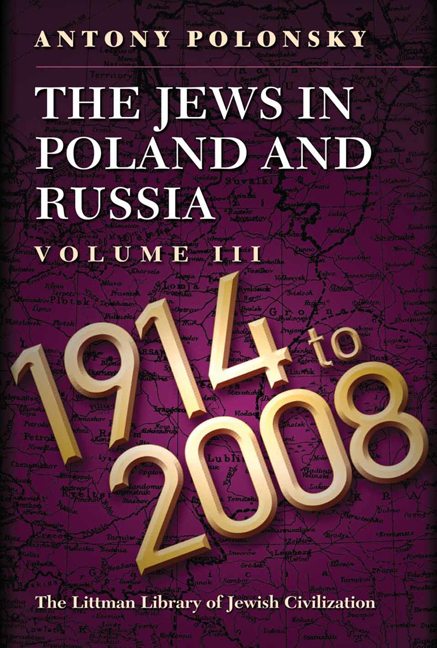Book contents
- Frontmatter
- Dedication
- Acknowledgements
- Contents
- List of Maps
- List of Tables
- Note on Transliteration
- Note on Place Names
- Maps
- General Introduction
- PART I FROM THE FIRST WORLD WAR TO THE SECOND
- PART II WAR AND GENOCIDE, 1939–1944
- PART III FROM THE END OF THE SECOND WORLD WAR TO THE COLLAPSE OF THE COMMUNIST SYSTEM
- EPILOGUE JEWS IN EASTERN EUROPE AND RUSSIA SINCE THE END OF COMMUNISM
- Conclusion
- Glossary
- Bibliography
- Index
10 - The Prelude to the ‘Final Solution’, 1939–1941
- Frontmatter
- Dedication
- Acknowledgements
- Contents
- List of Maps
- List of Tables
- Note on Transliteration
- Note on Place Names
- Maps
- General Introduction
- PART I FROM THE FIRST WORLD WAR TO THE SECOND
- PART II WAR AND GENOCIDE, 1939–1944
- PART III FROM THE END OF THE SECOND WORLD WAR TO THE COLLAPSE OF THE COMMUNIST SYSTEM
- EPILOGUE JEWS IN EASTERN EUROPE AND RUSSIA SINCE THE END OF COMMUNISM
- Conclusion
- Glossary
- Bibliography
- Index
Summary
Our strength consists in our speed and in our brutality. Genghis Khan led millions of women and children to slaughter—with premeditation and a happy heart. History sees in him solely the founder of a state. It is a matter of indifference to me what a weak western European civilization will say about me.
I have issued the command—and I will have anybody who utters but one word of criticism executed by a firing squad—that our war aim does not consist in reaching certain lines, but in the physical destruction of the enemy. Accordingly, I have placed my death-head formations in readiness—for the present only in the East—with orders to them to send to death mercilessly and without compassion, men, women, and children of Polish derivation and language. Only thus will we gain the living space [Lebensraum] which we need. Who, after all, speaks today of the annihilation of the Armenians?
ADOLF HITLER, 22 August 1939‘The solution of the Jewish question’ by the Germans—I must state this with a full sense of responsibility for what I am saying—is a serious and quite dangerous tool in the hands of the Germans, which is facilitating the ‘moral pacification’ of broad sections of Polish society … Although the nation loathes them mortally, this question is creating something of a narrow bridge upon which the Germans and a large portion of Polish society are finding agreement.
JAN KARSKI, February 1940THE PERIOD between the German invasion of Poland on 1 September 1939 and the beginning on 22 June 1941 of Operation Barbarossa, the Nazi plan to conquer the Soviet Union, saw a transformation of the situation in eastern Europe and a serious deterioration in the position of the Jews. The defeat of Poland resulted in the partition of the country between Nazi Germany and the Soviet Union, which made further territorial acquisitions at the expense of Finland in early 1940 and annexed the Baltic states, northern Bukovina, and Bessarabia in June of that year. Both the Nazis and the Soviets acted with great determination and brutality to incorporate the areas they now controlled.
- Type
- Chapter
- Information
- The Jews in Poland and RussiaVolume III: 1914 to 2008, pp. 361 - 412Publisher: Liverpool University PressPrint publication year: 2012

